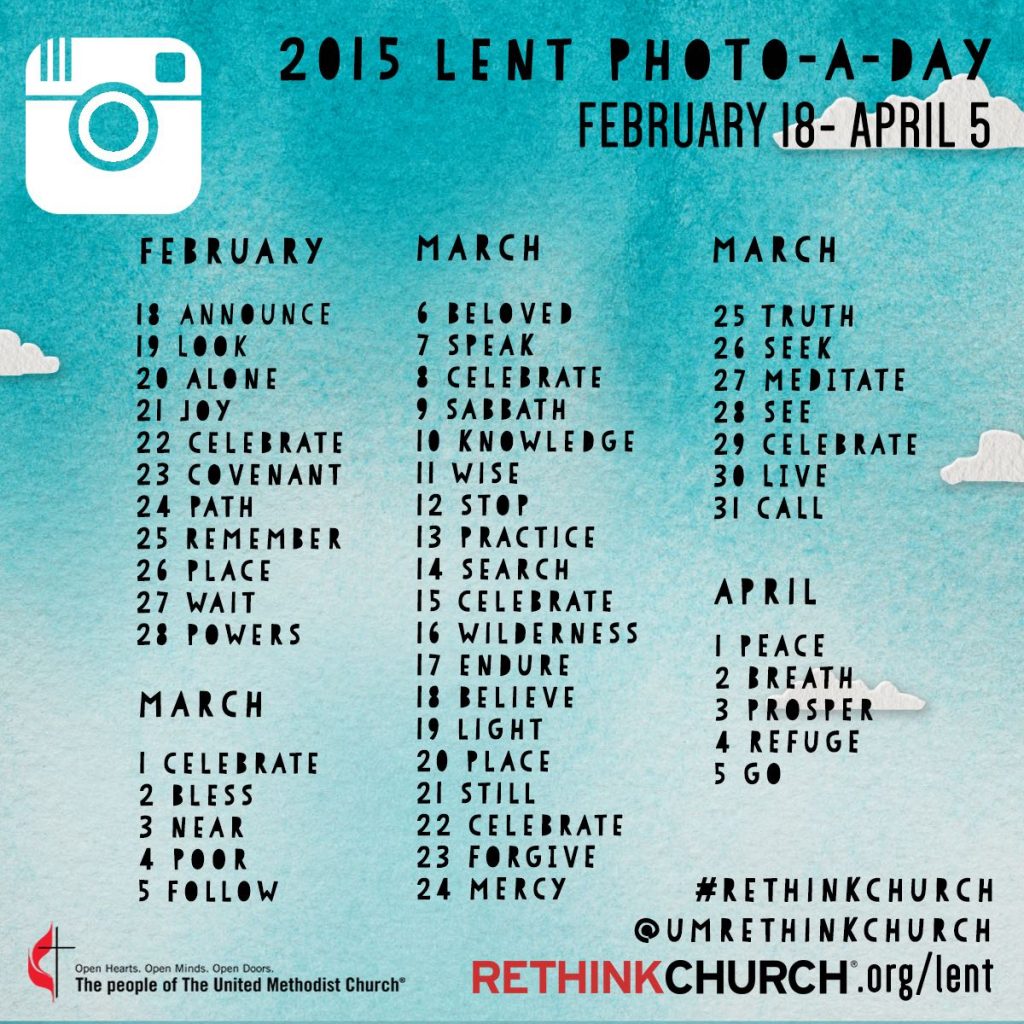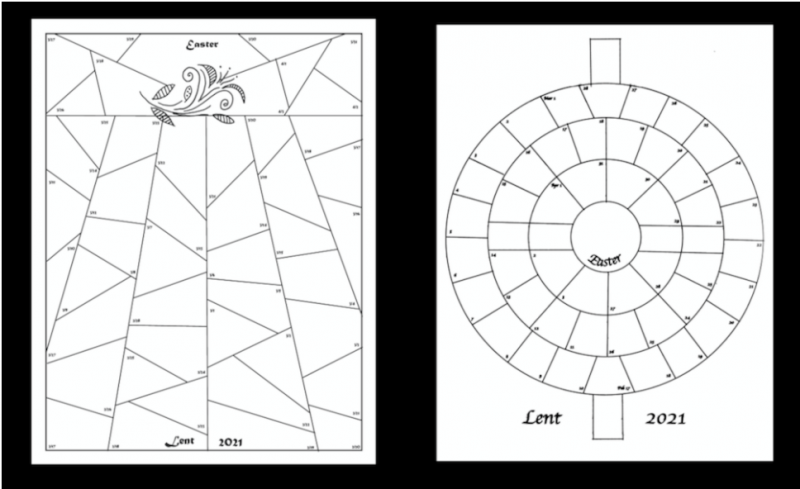We live in a visual world which beckons us to stop, look and reflect. But most of us are too busy to do so. Rethinkchurch.org has a great suggestion for a very visual way to celebrate the season of Lent that calls us to do just that, one which you may want to start now even though the season is half over.
Whatever your practices this season, will you join this photo-a-day challenge and share with the community how you perceive each word or phrase for the day? No explanation needed, unless you want to. After all, a picture is worth a thousand words. Learn more.
Not surprisingly, this exercise brought to mind Christine Valter’s Paintner’s book Eyes of the Heart: Photography as a Christian Contemplative Practice, in which Christine redefines photography as a receiving rather than a taking skill. She points out that the traditional perspective of photography is aggressive – we shoot or take photos. Yet really we are receiving an image, the transmission of light from a scene or object that God has created.
By bringing the camera to the eye and allowing an encounter with the holy to open our hearts, we have the possibility for a transformative potential from the photographic encounter. Look through the lens and imagine that it is a portal to a new way of seeing. (15)
So if you have more time than the exercise above calls you to, take some time to reflect on your photo. and consider some of Christine’s provocative questions:
What is hidden and what is revealed in your photo.
What is mirrored back? Traditional SLR cameras use mirrors to create images and in life we need polished inner mirrors that cultivate our capacity to see God more clearly in more places and experiences.
What new way of seeing either of God or of yourself has this photo opened for you?
I love this beautiful prayer by Dietrich Bonhoeffer, which I like to post each year as a Lenten prayer. It challenges me with what it means to follow Jesus as we walk towards the cross. It formed the centre of my meditation this morning – so challenging knowing where his journey led. This prayer was used as one of the Lenten meditations in The Mosaic Bible. This year I have included a short youtube video with an overview of Bonhoeffer’s life. It ends with a challenge for us to engage in the injustices of our world. We may not believe that what Bonhoeffer did was right, but his willingness to confront the issues of his day is something that we all need to take seriously.
I Cannot Do This Alone
O God, early in the morning I cry to you.
Help me to pray
And to concentrate my thoughts on you;
I cannot do this alone.
In me there is darkness,
But with you there is light;
I am lonely, but you do not leave me;
I am feeble in heart, but with you there is help;
I am restless, but with you there is peace.
In me there is bitterness, but with you there is patience;
I do not understand your ways,
But you know the way for me….
Restore me to liberty,
And enable me to live now
That I may answer before you and before men.
Lord whatever this day may bring,
Your name be praised.
Amen
And hopefully your will have time to watch this compelling documentary about his life too.
Photo above: Dietrich Bonhoeffer – Charles Pate http://cpatejr.blogspot.com/2011/10/prison-project.html

Soul care or care of our inner spiritual life is a lifelong process. It is worthwhile during this Lenten season to reexamine it. Procrastination is one of our favorite habits, made worse by social media such as Facebook. Procrastination is what we do to avoid doing what we should be doing. Playing games in soul care is a form of procrastination. Soul care is hard and painful work as we peel away layers of resentment, unforgiveness and bitterness. It also needs us to distinguish and identify who we really are (real self), who we think we should be (duty self), and who we think others think we should be (perceived self). We play games to distract us from the real work of reconciliation of our fragmented selves.
Many of us do not really like our real self. It is sometimes questionable if we really know who our real selves are. Our real self is who God has created us to be. Some of us wonder if people will still like and love us if they know who we really are. This sense of unworthiness poisons our relationships. We sense the darkness inside us, a beast that struggles to be free. We are so afraid and ashamed of our humanity. We listen to inner voices that compare ourselves with other people and tell us that we are not good, beautiful, smart or talented enough to be of any value. Lent reminds us that in spite of all our faults, imperfections and self-delusions, God loves us enough to send his Son to die for us. God knows we are works in progress. We need to stop playing games and start reconciling with his Son, Jesus Christ.
Some of us live life out of a sense of duty. We impose rules and regulations upon ourselves so that we live a life worthy of God. This is especially common in those who seek to grow a deeper relationship in God. These people live out of a duty self. They live austere and sacrificial lives, thinking that is what God wants them to be. This may not be true. Their sacrifices may not be what God wants them to but what they think God wants them to. Jesus enjoys food and festivals as much as other people. Often such lives based on the duty self are deeply steeped in legalism, empty of joy and judgmental of others who do not do as they do. Lenten period is a time to reexamine our lives and stop playing games with our duty self. That is work righteousness. We need to repent and reconcile with our real self in Christ.
What others think of us is very important to many of us. It may not be apparent to us in our perceived self that we are giving others power to control who we are. The truth is that most people are not thinking of us. They are too busy thinking of themselves. The lie of the perceived self comes from our hearts. We are desperate for affirmation, love and company. So we try to be the someone who we think other people want us to be. This is a house of cards which may collapse anytime. Again, there is a need to reconcile our perceived self with our real self and find our affirmation, love and companionship in God.
Lent is a time to meditate and pray about reconciliation. God started this by becoming man and reconciled us to himself through his Son, Jesus Christ. We need reconciliation. Not only reconciliation with God but also reconciliation within ourselves. We need to reconcile our real selves with our duty and perceived selves. Let us stop playing games and get on with the real work of soul care.
Author:
 Alex Tang is an author, speaker, pediatrician and lay spiritual theologian. His main interests are in spiritual formation, spiritual direction and bioethics. He blogs at www.draltang01.blogspot.com and his website is www.alextang.org .
Alex Tang is an author, speaker, pediatrician and lay spiritual theologian. His main interests are in spiritual formation, spiritual direction and bioethics. He blogs at www.draltang01.blogspot.com and his website is www.alextang.org .
Photo by Alex Tang
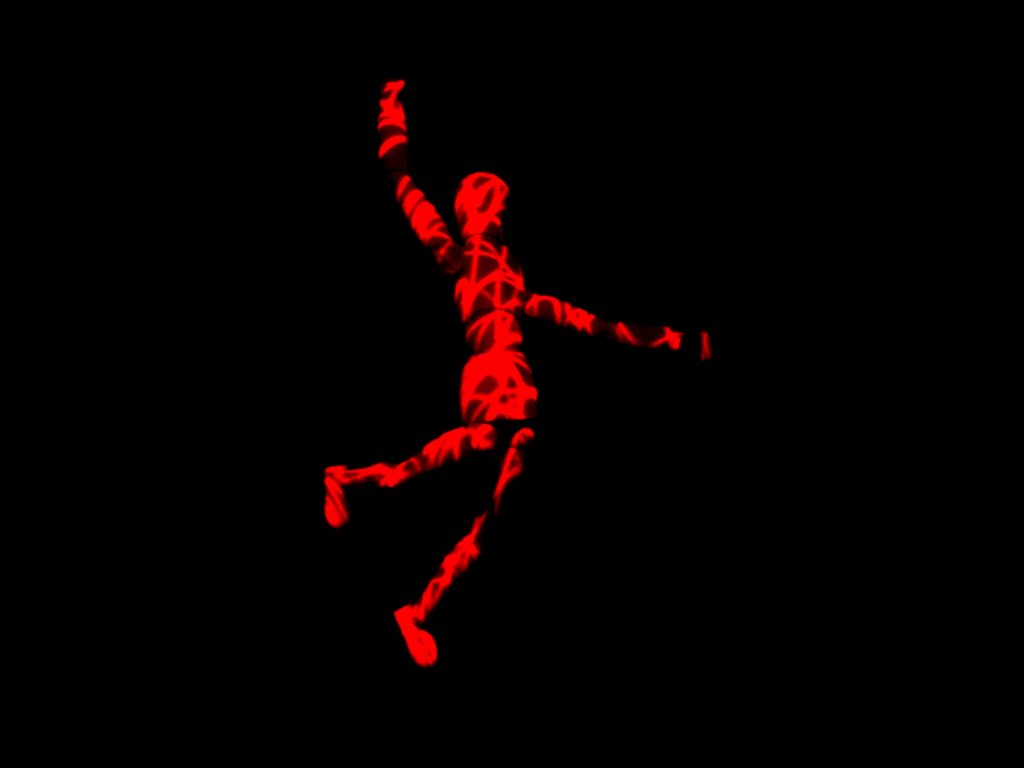 I am a heart, beating to the drum of creation, a percussive pounding in the chest of the church, jumping for joy. A leaping, living thing that softens with every break into deeper and lovelier ravines of gentleness and compassion, leading the dance of love where all believing begins. Will you join my rhythm?
I am a heart, beating to the drum of creation, a percussive pounding in the chest of the church, jumping for joy. A leaping, living thing that softens with every break into deeper and lovelier ravines of gentleness and compassion, leading the dance of love where all believing begins. Will you join my rhythm?
I am an eye, seeing everything in new perspective, reflecting rays, recording the holiness I hold before me on my retina, observing shapes and shadows, shades of light and dark, taking it all in and gazing with eternal perception. Will you let me be your lens?
I am a skeleton, a framework for flesh and tendons to hold to, a jointed, supple moving thing, an interconnection of bones all working together for your good. Built of rock and sharing DNA both with the smallest creatures in the ocean and with towering cliffs. Will you let me give you inner strength?
I am muscle, force and lifting power, biceps and triceps, covering the body with movement and momentum, container of kinetic energy and facilitating every step with my creative choreography and subtle twists and turns. Will you let me move you into new flexibility?
I am an ear, I am given to hearing. I am open to encouragement and to the music of the soul that will calm and beautify. I thrive on birdsong, but also on silence, which allows me to capture the words whispered in the still, small voice, a golden thread caught on the wind. Will you let me listen?
I am a hand, offered in help and given in friendship, shaken in greeting. I serve you in daily tasks, to honour and protect. I wash dishes and clean floors and write sonnets and play games. I paint and crochet and wipe and scrub. I do not mind, I give and receive gladly and obey the smallest movement of synapse. Will you let me serve you and others?
I am a foot, a traveller, a walker. I will take you where you need to go. I will make that first step that somehow is so hard, leaning into the act of forgiveness, beginning the journey of a thousand miles. I will find the footholds placed on mountain paths, and be lifted up by watchful angels. Will you let me carry you?
I am a set of teeth, standing stones in the jaw of time, grinding anxiety down in the night and tearing food for thought into smaller, more digestible pieces. I will look after you if you take care of me, and I will break everything down so that you don’t fall apart. I will chew on the word and meditate between my molars. Will you let me feed you?
I am a brain, an analysing thinker of deep thoughts and weigh-er of wisdom. I can read and create and make art and connection. I slip easily from memory to doctrine, weaving stories and teaching facts, seeking always to understand and clarify, yet glean most from mystery and magic, from prophetic parables. Will you allow me to instruct you as I in turn, learn?
I am a gut and stomach, the place where you get kicked most often, where you really feel and know. I am the one that digests and draws nutrition from all you take in, where decisions are made on what it good for you and what isn’t. I am your discernment, your choices churn here and the way is set before you. My acid rises when peace is far away, and stillness settles when you are on the right path. Will you let me help you decide?
I am those delicate parts, the ones that require modesty and protection. I deal with miracles of conception and birth, and yet also process and emit the waste and dirt. The sublime and the ridiculous are my chores and my privilege. I am frail yet strong. I hold the paradoxical nature of life within me. Will you honour and cover me?
I am a voice, which burns like coals in the prophet’s throat, which must be heard and hearkened too. I am the expression of love and wisdom’s words speak through no-one but me. I am the song brooding over you and the fragrant rising of prayers to heaven. I give sound to poetry and myth, to sermons and praise. Will you let me call?
I am God’s breath, sighed into all creation, exhaled like a gentle life-giving wave. I make all this dust and these dry bones rise up, I can hold your frame together, dear Body of my dear Son, if you will only let me. Allow each one to play the part for which it was made, exhort one another’s gifts and purpose, deign to one another’s destinies, and watch the world heal. Will you let me breathe?
© Keren Dibbens-Wyatt 2015
Keren Dibbens-Wyatt is a writer with a passion for prayer, church unity and the edification of women. She finds her joy in God’s colours, creatures and stories and attempts to share it with others through her work.
Links: websites http://www.kerendibbenswyatt.com/ or http://www.stillwatersministries.co.uk/
Or connect with Keren on facebook https://www.facebook.com/KerenDibbensWyatt
You can download Keren’s free ebook “Christian Prayers for the World” on ibooks, Lulu or Kindle. Christian Prayers for the World
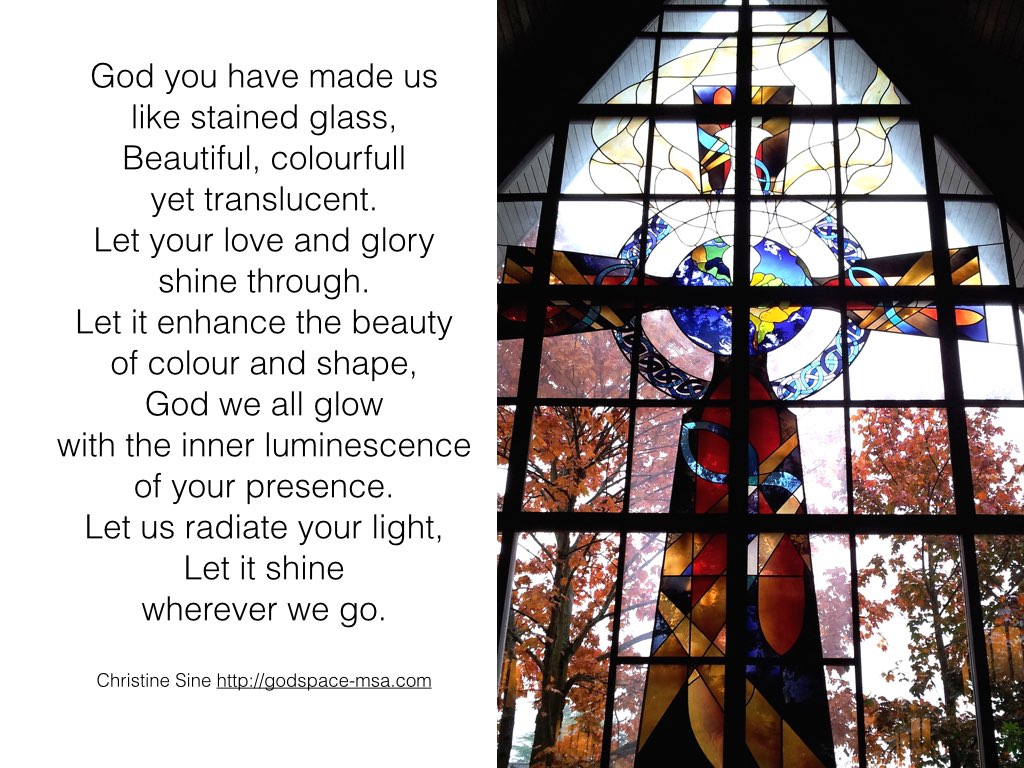
Each one of us is like a stained glass window – beautiful, colourful and translucent said our rector Cherry Hairston in a recent sermon. We are all beautiful in ourselves but made even more beautiful by the light of God that shines through us revealing an inner translucence that is breathtaking.
Part of the beauty of stained glass is that it is exactly that – the colours are not painted on but are deliberately created in the manufacture of the glass by the addition of metallic salts.
What is your response?
Read Psalm 139: 13-18. Look at yourself in a mirror. Look at the beauty God has created in the uniqueness of your features. The amazing complexity of each part of your body that was formed in your mother’s womb.
Read Psalm 139: 13-18 a second time. Visualize the “colours” that God has created in who you are that give you a unique luminescence when light shines through. Thank God for the beauty of who you are created to be.

Creation too is like stained glass, colourful, beautiful and translucent. The glory of God shines through it in vibrant colours.
What is your response:
Take a walk outside. Where do you see the the glory of God shining through with that inner luminescence? Take some photos of your favourite “translucent” scenes. Write about them in your journal. Thank God for the glory that shines through all creation.
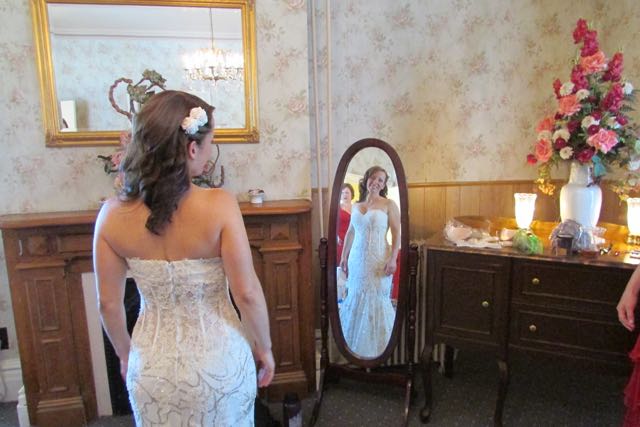
Often when we look at ourselves in a mirror, it is the flaws rather than the beauty we are most aware of. And in creation it is the pollution and the de-afforestation that can be most arresting. Yet the glory of God shines not just through a pristine untouched landscape, but through the pollution that makes the sky blaze with a glorious sunset, and through the mist that rises from a toxic stream.
What is your response.
Look at yourself in the mirror again. What flaws catch your attention? Now think about your personality and flaws you are aware of. Often it is our wounded areas that glow most brightly with the inner translucence of God.What are the wounded places in your life that glow with God’s presence? Write them down and thank God for divine light that shines in and through you.
Now listen to the song below and read through these lyrics of the refrain. What else is God saying to you today? How might you respond?
Let your light shine.
Let your love show
It’s a short ride
Down the long road.
When the rains come
And the winds blow
Let your light shine
Wherever you go.
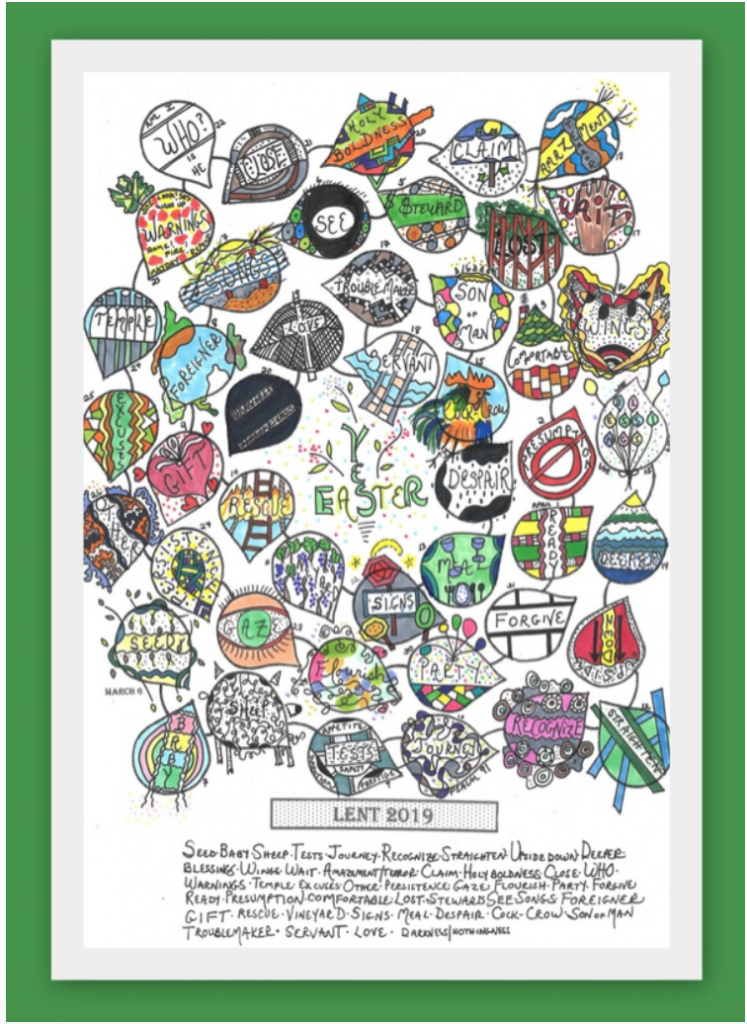
Several people have sent me links to wonderfully creative Lenten practices that make me feel – I wish I knew that before Lent! If you are like me now that the first week of Lent is over you may be looking for some more creative inspiration. So I thought that I would make Saturday a “Let’s Get Creative Day” and provide links to practices that continue to inspire me through the season. It might be too late to incorporate the practice into Lent this year but I suggest you tag it for consideration next year.
Praying in Colour is a great website to explore. For the season of Lent, there are Lenten calendar templates and spirals you can download that provide fresh daily inspiration for lenten observances.
I love these suggestions on how to use the calendar especially drawing on the very creative art of doodling which often inspires our imaginations and stirs our brains to find solutions to problems we are grappling with:
1) Pray for someone each day. Write a name, doodle around it, pray with words or in silence as you draw.
2) Choose a word from the Daily Lectionary or other reading and write it in the space for the day. Pray the word. Meditate on it. Spend time with it as you draw. Let it tell you about itself. Let God reveal something new to you about the word.
3) Write a word you associate with Lent–sin, forgiveness, journey, palms, Jesus, salvation, crucifixion, etc. Meditate on it. Spend time with it as you draw. Listen to what the word can tell you about itself. Let God reveal something new to you about the word.
4) Just doodle or draw in the space without words. Keep silence and listen for the “still small voice of God.”
5) Write one of the different names for God each day and pray/meditate on the name.
6) Write one of your character defects or “sins” in the space each day. Offer it up to God; ask for help and forgiveness. Very Lenten!
This post was inspired by my emphasis on creativity and imagination in our Lenten practices. You might also like to check out my other posts on creativity in Lent:
Seven Tips for Creating Sacred Space for Lent
5 Ways to Foster Creativity in Children for Lent
Get Creative and Play Games in Lent
Please check out our complete list of Godspace resources for Lent through Holy Week.
The Lenten prayer for this week is written by Trappist monk Thomas Merton. It is from fromThoughts in Solitude (1958).
My Lord God, I have no idea where I am going.
I do not see the road ahead of me.
I cannot know for certain where it will end.
Nor do I really know myself,
and the fact that I think I am following your will
does not mean that I am actually doing so.
But I believe that the desire to please you
does in fact please you.
And I hope I have that desire in all that I am doing.
I hope that I will never do anything apart from that desire.
And I know that, if I do this,
You will lead me by the right road,
though I may know nothing about it.
Therefore I will trust you always
though I may seem to be lost
and in the shadow of death.
I will not fear, for you are ever with me,
and you will never leave me to face my perils alone.
NOTE: As an Amazon Assoiciate I receive a small amount from purchases made through the link above. Than you for supporting Godspace in this way.
As an Amazon Associate, I receive a small amount for purchases made through appropriate links.
Thank you for supporting Godspace in this way.
When referencing or quoting Godspace Light, please be sure to include the Author (Christine Sine unless otherwise noted), the Title of the article or resource, the Source link where appropriate, and ©Godspacelight.com. Thank you!

